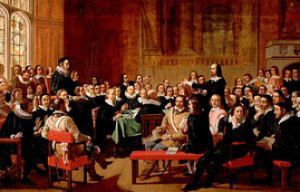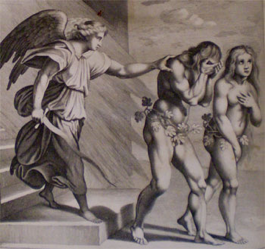When your husband is twice your age and still hasn’t outgrown the pretentious writer phase, it might be time to untie the knot.
But with the Anglican Church peering down its nose at your personal life, such a feat is out of the question. With little choice, you pack your bags and head to Mom’s for a night or two. . . Or three years. Meanwhile, hubby’s left out to dry, hanging by the still-legally-tied knot. But instead of incessantly chasing back after you, he takes the fight to the Man – and wins (sort of).
Starting in 1643, respected official and talented poet John Milton wrote a series of tracts advocating for divorce and went toe-to-toe with the Westminster Assembly (think: a churchy Parliament), raising no small amount of sand; most of his contemporary scholars were foaming at the mouth. However, somewhere between his position and charisma, he managed to sway the Assembly; as a result, they enacted the Westminster Confession of Faith, legalizing divorce only if a spouse left or cheated.
Through the four tracts (The Doctrine and Discipline of Divorce, The Judgment of Martin Bucer, Tetrachordon, and Colasterion), Milton declares that divorce should be an option for couples who simply aren’t compatible on a personal level. He shattered the traditional view of marriage as a means to an end (legitimate fornication and thus procreation) and instead offered a picture of it as a gateway to a happier life. He argues that good marriage provides a fulfillment and peace of mind not found in the single life, but when partners drift on the rocks or don’t see eye to eye, it drains all enjoyment from life. In other words, if you liked it and put a ring on it, then you should be able to take the ring off when it starts to cut your circulation.
So a 17th century Englishman disagrees with the church and respects individual feelings? This must’ve come from some great philosophical epiphany, right? Wrong.
In 1642, Milton married his first wife, Mary Powell. She was around 16, and he was 35 – cue the reality TV producers. Mary left him shortly afterwards and returned to her family, living with them for the next 3 years. The circumstances of their marriage and her reasons for leaving are unclear; what we do know is that Milton made a few attempts to get her back, all of which failed miserably. Cue Drake and The Script.
After a healthy dose of moping, Milton grew frustrated with the fact that he was still married to a woman no longer under his roof. Thus followed the realization that this could happen to any poor sap in his shoes, and so he started the tracts. In short, a single man (pun slightly intended) moved the mighty hand of the Anglican Church because he was salty about being dumped.
Some scholars opine that Paradise Lost is dotted with hints of Milton’s hang-up with breakups, especially through his portrayal of Adam and Eve. Indeed, it harmonizes well with the pervasive motif of separation throughout Milton’s life, considering his involvement in the English Civil War and the subsequent influence on his magnum opus. Regardless, he made a robust case for a necessary institution that has now become an American tradition. So now, when the repressed memories of your parents’ custody battle come back to haunt you, be sure to thank Milton.
Sources:
http://www.bartleby.com/217/0503.html
https://www.wwnorton.com/college/english/nael/17century/topic_1/divorce.htm
http://www.shmoop.com/john-milton/
https://en.wikipedia.org/wiki/Milton%27s_divorce_tracts



